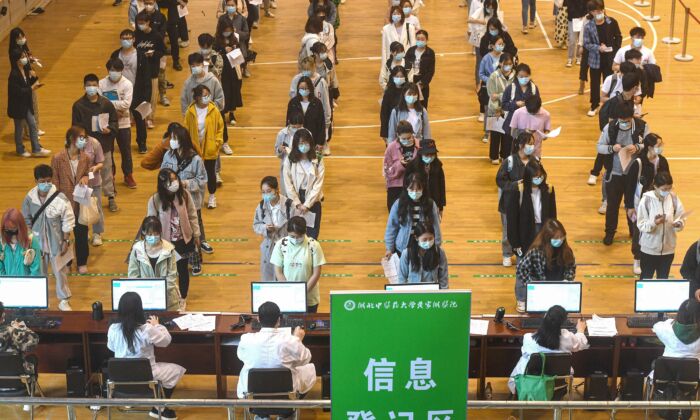It is now reasonable to draw a number of conclusions from the Wuhan or CCP virus. Conclusions which could also assist in relation not only to this but also future pandemics.
Any such conclusions should ideally emerge from reliable sources, seen through the prism of traditional principles and values, and buttressed by a good dose of common sense.
Reliable sources are those media sources that are seen to adhere to the first duty of the press, as was well explained by Robert Lowe, the Viscount Sherbrooke, in The Times in 1851. This, he wrote, is to obtain the earliest and most correct intelligence of the events of the time, and instantly, by disclosing them, to make them the common property of the nation.
As for common sense, this should be similar to that which guides so many in such diverse fields as small businesses, the trades and farming. But, unfortunately, such common sense increasingly seems to elude a surprising and increasing number in the academy, among the political class, the mainstream media and in boardrooms.
So I suggest the following conclusions that we can draw from the whole COVID-19 experience.
Pandemics require Time to Assess New Viruses and their Origins
Clearly, it can be argued that the best reaction when a virus emerges is to seal a country’s international borders until the virulence of the virus can be properly assessed.
It is also vital that countries find out the origin of the virus. Although originally dismissed by Lancet, it has become increasingly likely that the origin of the virus was in a laboratory rather than a Wuhan wet market. It would be a mistake to assume that this was only for some questionable form of gain-of-function research, but given the record of the Chinese Communist Party, it was likely that it was also for military purposes.
Affected Countries Should Claim Reparations
Countries affected adversely by the pandemic should be able to claim financial reparations from Beijing. This is, at the very least, for the breach of duty in both allowing New Year revellers to spread the virus across the world while closing internal travel and denying what they knew to be true—that is, that human-to-human transmission was not only possible, but was repeatedly occurring to their knowledge.
There is precedence for such action to occur. One only needs to look at the 1947-49 Corfu Channel Case, which was heard by the International Court of Justice. The case saw the United Kingdom awarded damages after the Peoples Republic of Albania, a Soviet satellite, started mining the English Channel.
Thus the case against China over the pandemic could be heard by an international commission overseen by a group of Western powers, and would presumably enquire into the international legal responsibility for releasing and, if relevant, engineering the Sars-CoV-2 virus. It could also assess the losses incurred by each of those powers.
Backed up by a signed treaty that provides each power with the ability to recover losses assessed from property within their jurisdiction. Each state would then legislate to give effect to the treaty internally.
While it is clear that no existing international body could be relied on to undertake a serious impartial inquiry and that Beijing would never genuinely cooperate with an investigation, it remains entirely unacceptable that Beijing should escape the consequences of its actions. There must be genuine contrition, a binding commitment that this never is repeated and a significant contribution to alleviating the loss of life and economic costs incurred around the globe.
Lockdowns Are Questionable
Only a virus that has a broad and extreme impact on the population, as the Spanish flu did, would justify lockdowns along the lines used by, say, communist powers. Even polio was not considered a justification for lockdowns that are currently used—intensely—in many countries. While the initial reason given was to flatten the curve—slow down infections so hospitals could cope. No one today believes that lockdowns will eliminate the virus.
Governments Should Protect the Vulnerable
One of the most important things this pandemic has demonstrated is that governments should take their responsibility to the vulnerable seriously. They should also pursue all forms of medical treatments, assessed by eminent scientists, and make those available to treat the virus.
The early approval and production of a number of vaccines, as seen in Operation Warp Speed, is an excellent precedent. However, as with all aspects of handling any new virus, full information needs to be made immediately available to the public, including the side effects and the effectiveness of each vaccine.
Freedoms Should Not Be Curtailed
One of the biggest lessons this pandemic has shown is that there is no justification for governmental secrecy as to advice or in curtailing fundamental human rights, including freedom of speech and the press.
The usual constitutional checks and balances should apply in relation to executive action. Interactive computer services which restrict such freedoms, either of their own initiative or in an arrangement or understanding with governmental authorities, should lose any legal exemption and be liable for breaches of laws including antitrust and of the constitution.
The Media Can Lose a Nation’s Trust
The crisis has demonstrated how easily a significant part of the mainstream media can depart from being free and responsible and holding a government accountable to becoming the propaganda arm of one major political party. This is unhealthy and leads inexorably to the loss of one’s freedoms.
This saga demonstrates the eternal truth of Ronald Reagan’s warning: Freedom is never more than one generation away from extinction.
As he said, “It must be fought for, protected, and handed on (to our children) for them to do the same.”

